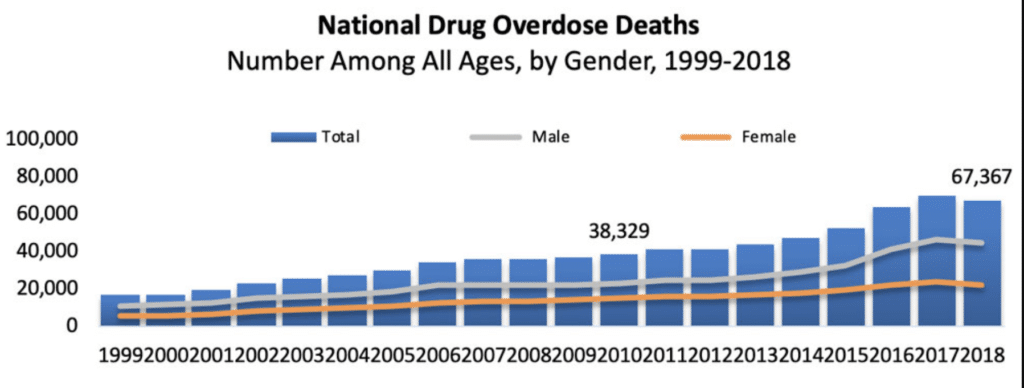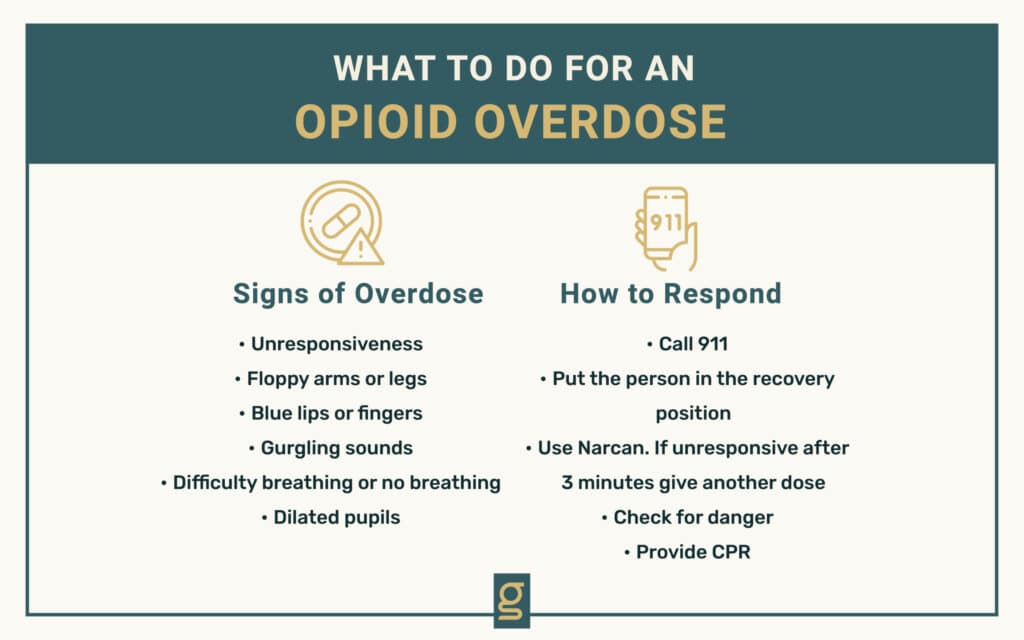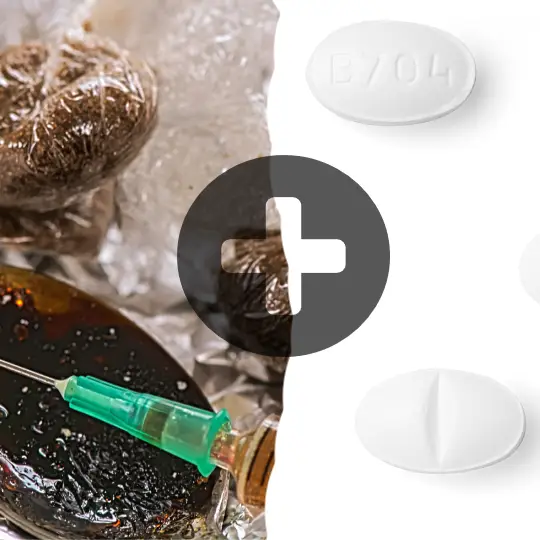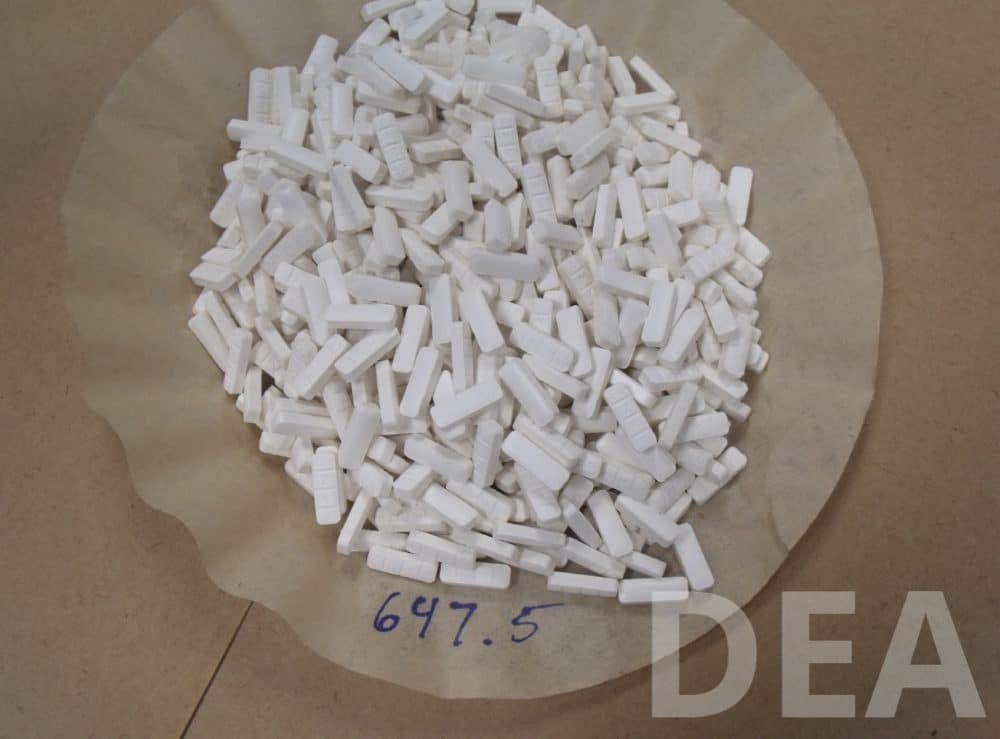In some situations, the unfortunate reality of addiction can mean death. According to the Centers for Disease Control and Prevention, overdose is a leading cause of death in America — that’s why International Overdose Awareness Day is important. It seeks to raise awareness of overdose, educate about how to reverse overdose and prevent death, and reduce the stigma of a drug-related death.
How Many Americans Die From Overdose?
Between 1999 and 2018, the amount of deaths from overdose have continued to rise. In 2017, the CDC reported that more than 70,000 people died from drug overdoses. While that figure declined in 2018, there were still a staggering 67,300 overdose deaths.

Source: Centers for Disease Control and Prevention, National Center for Health Statistics. Multiple Cause of Death 1999-2017 on CDC WONDER Online Database, released January, 2020
The overdose deaths range in numbers depending on the type of drug, however, opioids are by far the leading cause of overdose deaths.
Overdose by Drug Type
According to the CDC:
- Opioids: overdose deaths from opioids — including prescription opioids, heroin, and synthetic opioids — have increased almost six times since 1999. Overdoses involving opioids killed over 47,000 people in 2017, 36 percent of which involved prescription opioids.
- Psychostimulants (including methamphetamine): deaths from psychostimulants have risen drastically between since 1999, with as many as 12,676 people dying from overdose in 2018.
- Cocaine: overdose deaths from cocaine rose from 3,822 in 1999 to 14,666 in 2018.
- Benzodiazepines: overdose deaths involving benzodiazepines rose from 1,135 in 1999 to 10,724 in 2018.
What is International Overdose Awareness Day?
International Overdose Awareness Day is a global event held on 31 August each year. It was initiated in 2001 by Sally J Finn at The Salvation Army in St Kilda, Melbourne, Australia, to to raise awareness of overdose and reduce the stigma of drug-related death.
Since 2001, many organizations and communities worldwide have held events to raise awareness and commemorate those who have lost their lives to drug overdose.
In 2012, International Overdose Awareness Day has been led by public health organization, the Pennington Institute. Last year, 874 events took place in 39 countries. 2020 is International Overdose Awareness Day’s 20th anniversary and it is hoped more events will take place this year.
The main aims of International Overdose Awareness Day are to raise awareness of overdose, reduce the stigma of drug-related deaths, and stimulate conversation about overdose prevention and drug policy. The day also acknowledges the grief felt by families and friends whose loved ones have died from drug overdose.
The main goals are:
- To provide an opportunity for people to publicly mourn loved ones in a safe environment, some for the first time without feeling guilt or shame.
- To include the greatest number of people in International Overdose Awareness Day events, and encourage non-denominational involvement.
- To give community members information about the issue of fatal and non-fatal overdose.
- To send a strong message to current and former people who use drugs that they are valued.
- To stimulate discussion about overdose prevention and drug policy.
- To provide basic information on the range of support services that are available.
- To prevent and reduce drug-related harm by supporting evidence-based policy and practice.
- To inform people around the world about the risk of overdose.
Overdose Awareness Day is important because we need to encourage people to find recovery through addiction treatment, help reverse overdose deaths with lifesaving medication like naloxone (Narcan), and help prevent overdose through education. It’s also important to pay tribute to those who have lost their lives.
Our goal at Gallus is to provide education and resources to create awareness about addiction treatment services for those struggling, to help bring the number of overdose deaths down.
How You Can Get Involved in Overdose Awareness Day
There are numerous ways you can show your support for International Overdose Awareness Day, including:
- Wear a silver badge, purple wristband or purple lanyard as a symbol of overdose awareness on August 31
- Recognize the signs and symptoms of overdose: unresponsiveness, floppy arms and legs, blue lips or fingers, gurgling sounds or difficulty breathing, cessation of breathing, dilated pupils
- Carry Narcan & know how to use it
- Pay tribute: https://www.overdoseday.com/tributes-a/post-a-tribute/
- Display empty hats of shoes to represent those who lost their lives
- Share information and resources — like our social graphics – to spread awareness.
Signs of an Overdose and What To Do
There are key signs that someone may be experiencing an overdose. Be sure to look out for the signs in our helpful graphic, as well as taking the necessary action.
If you, or your loved one are struggling with addiction, call us today for a free assessment: (720) 669-8178.




 Steve Carleton
Steve Carleton 